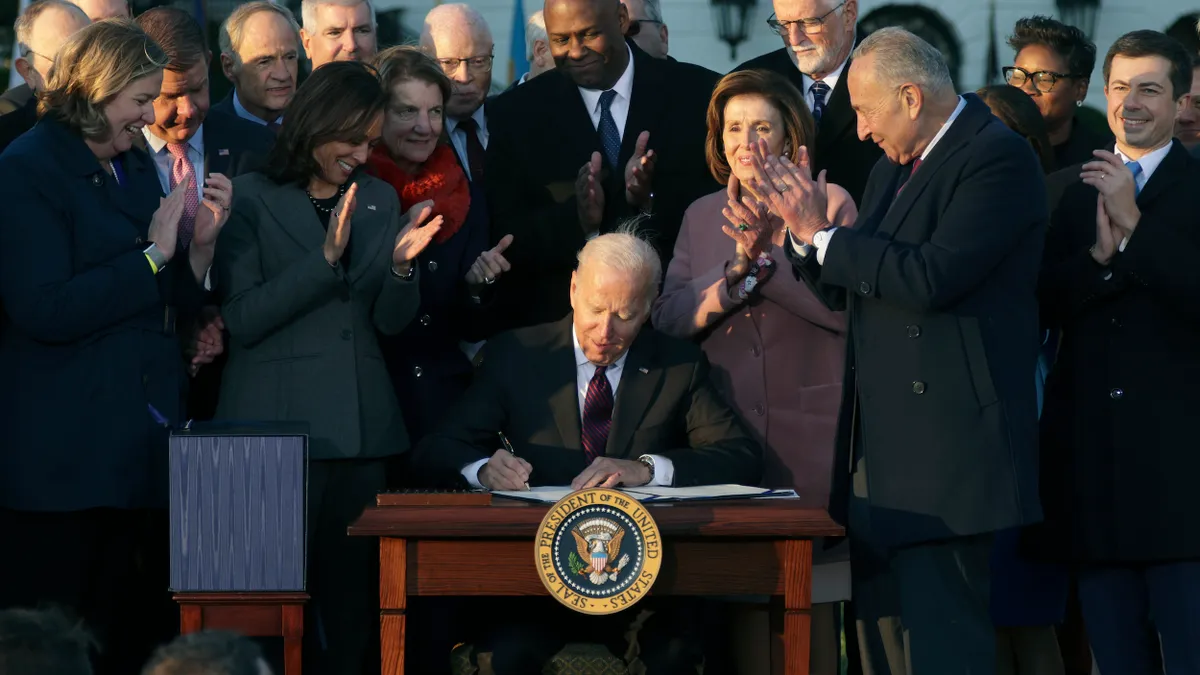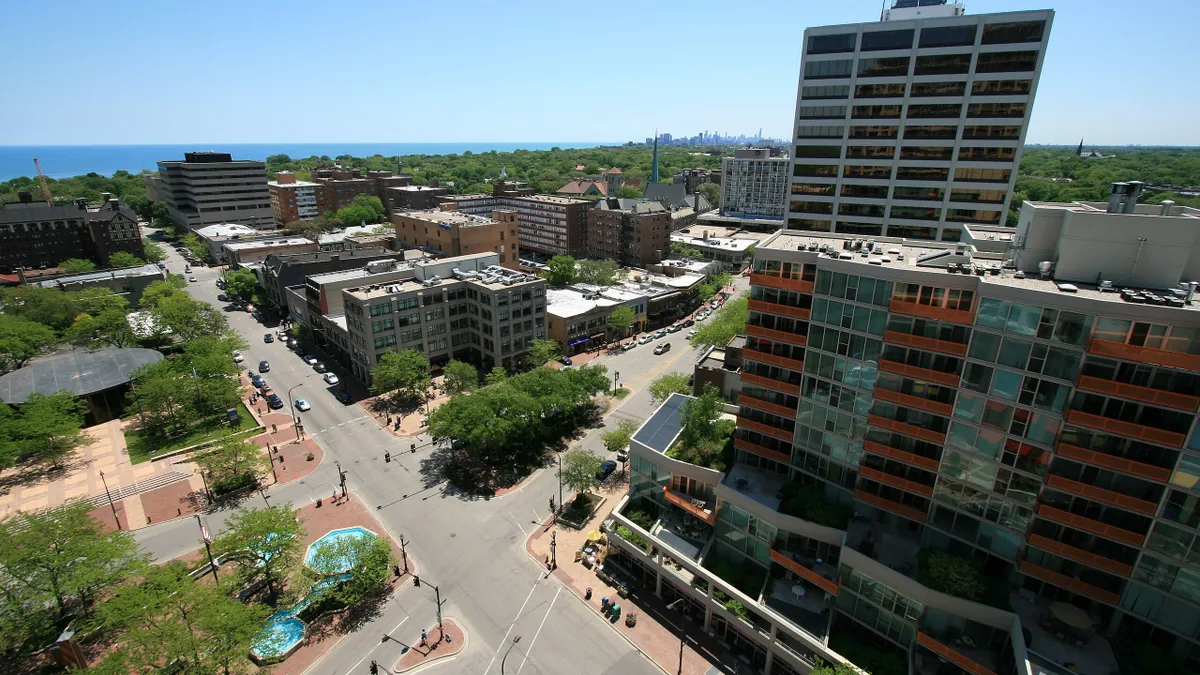There is no hard and fast rule for what makes a city smart, but one group is trying to help certify cities that have a smart policy for their data.
Launched by Bloomberg Philanthropies in 2015, What Works Cities is a national initiative to help 100 mid-sized U.S. cities better use data and engage residents. Its focus on mid-sized cities — 100,000 to one million people — helps highlight manageable smart city projects for wide swatches of American cities that might not have the resources or scale of New York or Los Angeles.
However it was clear that more cities wanted specifics on data practices and benchmarks to compare their efforts. So, What Works Cities announced a certification process where any city with a population over 30,000 is eligible to apply. In the first round, 200 local governments filled out a questionnaire about their open data policies, data governance, performance analytics, results-driven contracting and how they’ve repurposed resources after results. Later this year, after an evaluation of applicants’ efforts, high-achieving cities will be awarded with silver, gold, or platinum certification.
Smart Cities Dive caught up with Simone Brody, the executive director of What Works Cities, to learn about the certification process, open data and what states and the federal government could learn from the cities that are becoming smart.
The following transcript has been edited for brevity and clarity.
SMART CITIES DIVE: Why did What Works Cities decide to do a certification program?
SIMONE BRODY: You know, we have great folks in city governments around the country that just aren't trained on how to implement and use data systems to do their work. What Works Cities fundamentally provides technical assistance [and] commits resources around the country to help them better use tools like performance management systems or release data to the public to start a dialogue with residents and internally about, what are our goals as a city? And how we are we progressing towards them?
We launched in April of 2015 and the first few years of our work, we quickly realized that there was actually demand far beyond working with 100 cities. Again, we're working with mid-sized cities but there was a ton of demand even in the small and larger cities, to say, "Okay, we are really excited to work but tell us exactly what we need to do."
From that was born our certification process. Essentially what we're doing is a good government's stamp of approval. And what we're saying is, what does it look like to be a really effective government? ... We've laid out a list of 50 indicators that we believe identify, what does good government look like from a policy, a process and an organizational structure perspective?
We told cities, you know, "Take a look at this assessment and then tell us how you're doing," both for purposes of celebrating the cities at the very top but frankly, we know that there are far more cities that are just starting out in this work. The goal of certification is largely to help all cities advance their practice. It's been great to see both the number of really high-performing cities that have applied but actually the number of cities that said, "We're getting three out of the 50 things you told us we should be doing around data and we're really excited to submit this because we are excited to get your support and guidance on how we can come back next year to say we're doing 15 or those thing or 20 of those things."
It serves as much as a mechanism for kind of celebrating the best and giving them a platform for others to emulate, but also for creating a roadmap for all cities to really advance in this work.
Besides maybe limited resources, are there things that you keep seeing cities struggling with when it comes to their data policies?
BRODY: We put out a brief a little over a year ago on the City Hall data gap and it really outlines the fact that a lot of cities started this work. They set up a set of score-mix goals or they purchased an open data portal, but what they're not doing is effectively using them on a regular basis to inform their decision-making. You know, cities set up goals but they never tracked progress toward them and they never talked to the public about how they're making progress toward them. Or they set up an open data portal but they don't regularly release data to that portal and so, you know, the information gets stale very quickly.
What we really are helping cities do is, how do you embed this work and these processes into your general operating procedures as a city? It's been so exciting because city leaders, frankly, are thrilled to be given this opportunity to kind of expand their skills and to advance the work in their cities. That's, I think, been the biggest need, is helping these very talented folks in city government get the skills to just do their jobs better and get better outcomes for their community.
"It's been so exciting because city leaders, frankly, are thrilled to be given this opportunity to kind of expand their skills and to advance the work in their cities."

Simone Brody
Executive Director, What Works Cities
For some of the smaller cities that you're working with, are there any under-the-radar projects that you've seen done that have really blown you away?
BRODY: I think the most interesting thing we've seen is how cities are starting to use data to really start a dialogue with their residents. Buffalo, NY's a good example. They have this program called Clean Sweep and they look at 311 data [and] all the complaint data they're getting. They basically use it to create the targeted plan around addressing issues in cities.
They, on a given week, will pick a street or pick an area and they'll have their full support team go into that area to fix the streetlights and fix the roads. They even had a program where they had these dentists going into homes and doing free dental check-ups. How cities use data to really target communities and residents in need has been really interesting.
Some of the most interesting, exciting things people are doing around data, frankly, isn't even the complicated analytics, but it's how do you use that data to start a conversation with your residents around what they need? And how you can meet those needs.
We have a good example from Kansas City, they just passed an $800 million bond measure to fix the city's infrastructure. The streets and the roads and the bridges ... What they do is they use the results of [a] citizen survey to see what people want but they also have been building incredibly on a system of engagement that goes beyond that. They have a very robust system of interacting with people over social media ... During their performance management program meetings, which are called KCStat, they even tweet from there about the statistics that are coming up, how the city's progress is going, on many individual subjects. There's a regular conversation going between the city and the citizens.
What can states and even the federal government learn from what cities are trying to do?
BRODY: I think that this notion of trust is a really big one. What cities have now been able to do with open data — which is harder in small cities, frankly — is not just put out data and hope people come look at it but actually use it as a mechanism to build a relationship with residents, to say, "We know these are things you care about so we're going to show you how we're doing."
The police data, obviously a very controversial topic but more and more cities are putting out this data because they're saying, "We want to have a dialogue about how we can get better with this." I think there's a lot that states and the federal government can do around, how do we use information as a way to bridge a conversation divide?
I think, to that point, that's a pretty bipartisan sentiment. We work with Republican and Democratic cities and what we see is that this notion of like, "Here's a program that's actually producing results." We can get anybody on board with that. I think it kind of cuts through some of the partisan rhetoric we're hearing a lot now, where you can actually just have a common set of facts around what is working and focus there and not have it be so special interest-driven.
Do you think there could be ever too much data, and we're going to have to re-think how we process it or deal with it?
BRODY: I think this notion of the quantity of data and also privacy are, like, the two big issues we're seeing with data right now. Frankly, for many communities, there almost is already too much data. Cities are not doing a great job of processing it. They're just, like, spitting it out through these open data portals. People aren't looking it, because it's hard to process.
"Frankly, for many communities, there almost is already too much data. Cities are not doing a great job of processing it."

Simone Brody
Executive Director, What Works Cities
What we try to do ... is really think of their goals in releasing this data. Are there certain groups of stakeholders that are going to be particularly interested in this data that you want to aim? So it's not just about putting out data. It's about, what's the form that you're putting it out in? Then, is there an actual call to action? How can you use the process of releasing data to actually start a conversation?
I think people are thinking much more, and hopefully will over time, think much more about, what's our end goal in releasing the data? What's our need? And how do we start a dialogue using that data? I think that's a really big challenge we have now with cities and that's probably Open Data 2.0, not just transparency for transparency's sake but using this data to get to a better outcome.
On the privacy side, I think it's another thing we're really thinking about. How do we make sure that they're producing what we need them to produce but also how do we think about the bias in all of these things? And really make sure that as we think about artificial intelligence, to think about these other things, we're not incorporating bias into this.
To that point, we work with the Sunlight Foundation, our partner, and they're very focused on this question of how are we using data as a mechanism for transparency to make sure the information is out there?
How has the certification process been so far?
BRODY: It's been great. We had a ton of cities apply. We've had interest from over 200 municipalities. Now we're going through the process of having them share their actual results with us. I think it's very early. We just got most of the data to hand [recently], but we are seeing the cities at the top end, which you would expect and we're excited to celebrate them. But there's also a number that have really been honest about the fact that they're just starting out in this work and they are excited to use this as a mechanism to improve and enhance.
One thing that was great when we launched is just how many people came out in support of certification and said, "This is something we've really needed for a long time." I do think there's a real need for this. We don't want this to be a mechanism by which we say, "Here's how poorly you're doing. Good luck."
But really, what is the way that we can support cities and continue to advance that, even if we're not there with the full technical assistance engagement? What are the ways that we can both, from assumptions perspective and from an emotional, to support them in continuing to do this work?



















